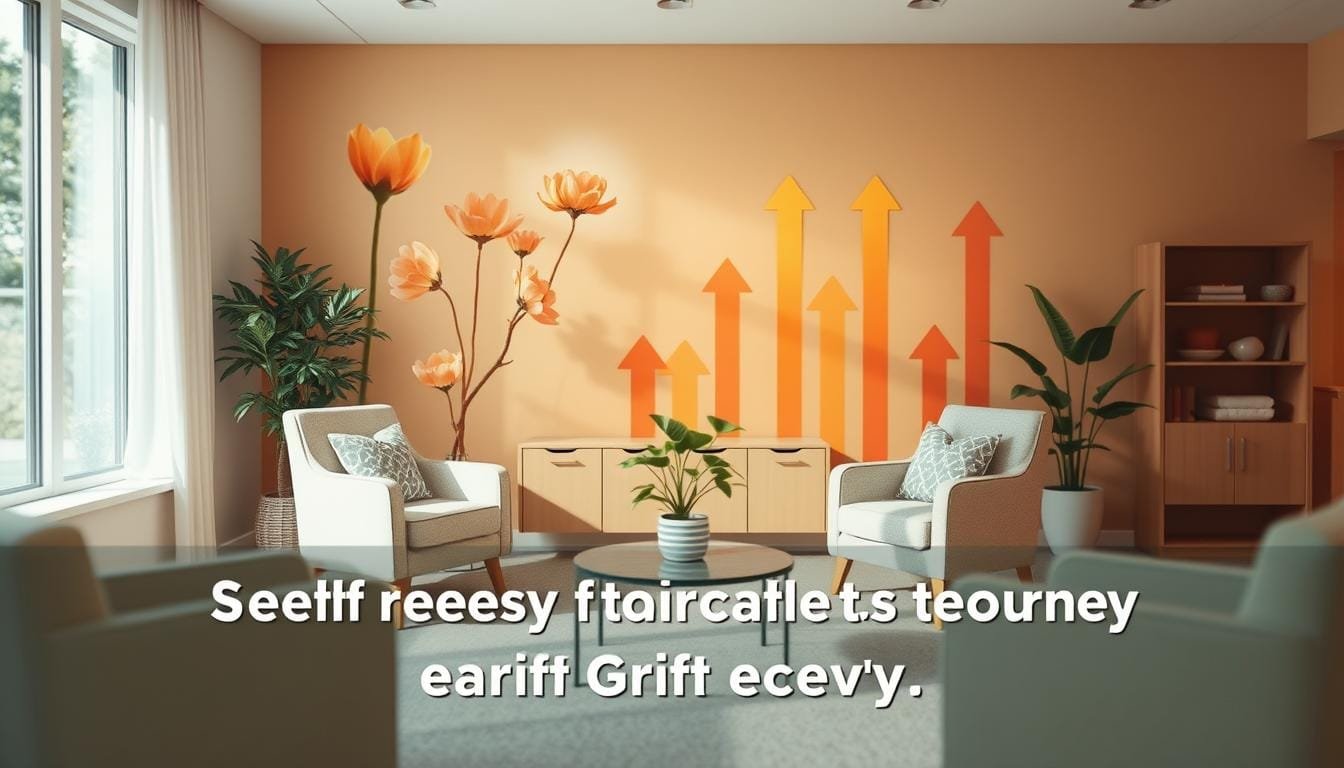Imagine someone struggling with addiction, stuck by fear and old patterns. Sarah, a young professional, fought alcoholism for years. She tried many times to stay sober but always fell back. Then, she found motivational interviewing (MI).
Sarah’s path to recovery was tough, but a caring therapist helped her. They used MI to unlock her inner strength. Together, they talked about her doubts and found her reasons to change. They made a plan to beat her cravings.
Sarah’s story is common. Millions worldwide struggle with addictions and bad habits. But, with the right help, they can overcome. Motivational interviewing is a key tool in this fight. It’s a powerful method that changes lives in addiction treatment.
Key Takeaways
- Motivational interviewing (MI) is an evidence-based approach that strengthens an individual’s motivation and commitment to change.
- MI helps overcome lack of motivation, a significant hurdle in addiction recovery, by treating motivation as an interpersonal process.
- MI encourages patients to create their own goals and feel empowered in their recovery journey, leading to more sustainable and long-lasting behavior changes.
- Research shows that MI is effective in treating various conditions, including addiction, across diverse populations.
- MI can be used in conjunction with other evidence-based therapies, such as cognitive-behavioral therapy, to enhance the effectiveness of addiction treatment.
Understanding the Foundations of Motivational Interviewing
Motivational Interviewing (MI) is a team-based, goal-focused counseling method. It was created by Dr. William R. Miller, a renowned professor at the University of New Mexico. It’s based on social psychology and focuses on the relationship between the therapist and patient, their goals, and their freedom to choose.
Origins and Development by Dr. William R. Miller
Dr. Miller mentioned Motivational Interviewing for the first time in 1983. It has been studied and used a lot ever after. MI combines different therapy styles, like humanistic and cognitive dissonance theories, to help people overcome their doubts about changing.
Core Philosophy and Approach
Motivational Interviewing is all about working together. It respects the patient’s freedom and inner drive. The goal is to help the patient find and build their reasons for change, not to push them.
Scientific Basis of MI
MI has a strong scientific backing, with over 25,000 research papers and 200 controlled trials. Studies show it works well in stopping bad habits, starting good ones, and solving health issues.
“Motivational Interviewing principles empower individuals to explore their motivations, strengthen their belief in change, and collaborate effectively towards positive outcomes.”
Motivational Interviewing is special because it focuses on the relationship, the patient’s goals, and their freedom. It’s a powerful way to help people change in many areas, like health, education, and personal growth.
The Power of Motivational Interviewing for Habit Recovery
Motivational Interviewing (MI) is a powerful tool in addiction recovery and changing behavior. It focuses on working together, understanding, and not judging. This helps people face their denial, think about quitting, and decide to change on their own.
Studies show MI works well for alcohol addiction. It involves listening carefully and understanding the person’s view without judging. This helps them see the gap between their actions and their goals. It’s a way to encourage change without arguing, which can make people resist.
MI is not just for addiction. It also helps in health and mental health. It was created in the 1980s by William R. Miller and Stephen Rollnick. It helps people find their own motivation to change their behavior.
| Technique | Description |
|---|---|
| Elicit-Provide-Elicit | This technique involves getting the client’s thoughts, providing information, and then getting their feedback. |
| Decisional Balance | The decisional balance technique helps clients understand their values and priorities when thinking about change. |
MI is all about the therapist guiding but keeping the focus on the client. This approach is very effective in addiction treatment. It helps build confidence in the person’s ability to change. This creates momentum and helps overcome doubts and hesitation.
“Motivational Interviewing is a collaborative conversation style for strengthening a person’s own motivation and commitment to change.”
In addiction recovery, health, or mental health, MI’s strength is in engaging clients and empowering them. It helps people take control of their own change.
Key Principles of the MI Methodology
Motivational Interviewing (MI) is a way to talk that helps people want to change. It’s based on working together to reach goals. It uses several key principles to guide the process.
Expressing Empathy in Practice
Empathy is key in MI. The therapist tries to understand the client without judging. They listen well and show they get what the client feels.
This makes a safe space for talking and exploring feelings.
Developing Client Discrepancy
MI helps clients see the gap between what they do now and what they want. The therapist points out this gap gently. This encourages the client to think about changing and the benefits of it.
Supporting Self-Efficacy
Believing in oneself is important for change. MI boosts the client’s confidence. It focuses on their strengths and past successes.
The MI principles of empathy, discrepancy, and self-efficacy help clients feel ready to change. They create a supportive environment for lasting changes.
The Four Essential Processes in MI Sessions
Motivational Interviewing (MI) uses four key processes to help clients change for the better. These are engaging, focusing, evoking, and planning. Each one is vital for the MI approach, which focuses on the client.
Engaging starts with building trust and respect. This is done through listening, empathy, and not judging. It’s the base of the MI session.
Focusing finds the main change the client wants to make. Together, they pinpoint a clear goal. This makes their work more focused.
Evoking brings out the client’s reasons for change. The therapist helps them see why they want to change. This is about finding their own motivation.
Planning is about making a plan to change. They set goals, talk strategies, and find support. This ensures the client can succeed.
These steps help clients get engaged, focused, and motivated. They also plan how to make changes happen. MI helps clients move past doubts and make real changes.

“The spirit of MI is comprised of four components: collaboration, evocation, acceptance, and compassion.”
Therapeutic Techniques and Strategies in MI
Motivational Interviewing (MI) uses special techniques to help people talk and change in a positive way. These include open-ended questions, affirmations, and listening. They also help clients talk about their desire for change.
Open-Ended Questions and Active Listening
Open-ended questions are key in MI. They ask clients to share their thoughts and feelings deeply. This helps them explore their habits and reasons for change.
Active listening is also vital. Therapists listen carefully to what clients say. They understand the client’s feelings and needs. This builds trust and helps clients feel heard.
Affirmations and Reflective Statements
Affirmations are important in MI. They praise clients for their efforts and progress. This boosts their confidence and helps them stay on track with change.
Reflective statements help summarize what clients say. They clarify the conversation and guide the client towards a plan for recovery.
Change Talk Facilitation
MI experts help clients talk about their desire for change. They encourage clients to share their reasons for wanting to change. This boosts their motivation for lasting change.
“Motivational Interviewing is a collaborative, goal-oriented style of communication with particular attention to the language of change. It is designed to strengthen personal motivation for and commitment to a specific goal by eliciting and exploring the person’s own reasons for change within an atmosphere of acceptance and compassion.”
Building Client Motivation and Commitment
Motivational interviewing (MI) is a powerful method for building client motivation and commitment. It focuses on empathetic listening and understanding. This helps individuals tap into their strengths and desires for change.
MI is used in counseling, healthcare, and social services. It inspires people to set and pursue higher goals. This leads to positive and lasting change. Clients explore their reasons and capabilities for motivation building, increasing their commitment to change and self-motivation.
MI is great because it reduces resistance to change. It creates a non-judgmental, collaborative environment. This makes clients feel heard and understood, strengthening the therapeutic alliance and improving outcomes.
“Motivational interviewing is not about persuading people to change; it’s about helping them to explore and resolve their ambivalence.”
MI’s four core principles are key: expressing empathy, developing discrepancy, rolling with resistance, and supporting self-efficacy. These principles inspire clients to make lasting changes. Techniques like open-ended questions and reflective listening help clients reach their full potentials.

While MI is very effective, it should be part of a broader treatment plan. Combining MI with other approaches like behavioral healthcare and support groups helps clients achieve long-term recovery. This reduces the risk of relapse.
Overcoming Resistance and Ambivalence
Motivational Interviewing (MI) is a powerful method for tackling resistance in recovery and ambivalence. Instead of fighting resistance, MI therapists work with clients to accept it. This approach reduces defensiveness and encourages positive change.
MI excels in helping clients weigh the pros and cons of quitting a habit. This process, based on the client’s values, builds positive change momentum. It also lowers the chance of relapse.
Understanding Client Resistance
Resistance often arises when people are asked to change deeply ingrained habits. MI therapists see resistance as a natural part of the change process. They approach it with compassion and curiosity, helping clients find their own motivation for change.
Working Through Ambivalence
Ambivalence is a key part of the change process. Clients may want to change but also want to keep things as they are. MI helps clients discuss the pros and cons of change. This clarifies their values and strengthens their commitment to recovery.
Creating Positive Change Momentum
As clients work through resistance and ambivalence, they start to feel a sense of positive change momentum. This momentum grows as they see their ability to make changes. The therapist supports this by celebrating successes and encouraging the client along the way.
Motivational Interviewing tackles resistance and ambivalence with empathy and teamwork. This approach empowers clients to find their own reasons for change. It leads to lasting success in overcoming challenging behaviors.
Implementation of MI in Recovery Programs
Motivational Interviewing (MI) is now a key part of many addiction recovery programs. It’s used in places like the Jackson House Recovery Center in San Diego. MI works well with other therapies like cognitive-behavioral therapy (CBT). Together, they help people make lasting changes.
MI is great for treating many addiction issues, like alcohol and opioid use. It’s also useful for health problems like diabetes and obesity. This makes it easy for recovery centers to create plans that fit each person’s needs.
Using MI in recovery programs involves several steps. Trained counselors use special techniques to help clients move forward. They create a supportive environment where people can talk openly and plan for change.
| Key Advantages of Integrating MI in Recovery Programs |
|---|
|
By adding MI to their programs, top recovery centers help clients take charge of their recovery. This approach gives people the support and tools they need to overcome challenges and reach their goals.
Measuring Success and Progress in MI
It’s key to check how well Motivational Interviewing (MI) works. This helps us see its impact on treatment results and how to improve recovery plans. Experts have come up with ways to measure MI effectiveness, treatment outcomes, and progress evaluation in recovery programs.
One main sign of success in MI is if people use substances less. Research shows MI helps reduce how often and how much people use substances, at least in the short term. When MI is used with other proven therapies, it works even better over time.
But it’s not just about using substances less. Experts also look at how well people feel overall. This includes if they’re more motivated to change, have better mental health, and function better socially. These broader measures help us see how MI affects someone’s whole recovery journey.
It’s important to keep checking in and adjusting the treatment plan to keep progress going. Therapists and recovery programs regularly check how clients are doing. They look for areas to improve and tweak the MI approach to keep helping.
| Evaluation Metric | Measurement | Significance |
|---|---|---|
| Substance Use Patterns | Frequency, volume, and abstinence rates | Indicates the immediate and long-term impact of MI on substance use behaviors |
| Overall Well-Being | Mental health, social functioning, and motivation for change | Provides a holistic view of the client’s progress and quality of life |
| Treatment Plan Adjustments | Ongoing assessment and modifications to the MI approach | Ensures continuous improvement and responsiveness to the client’s needs |
By using these metrics, recovery programs can really see how well MI effectiveness is working. They can track treatment outcomes and make smart choices to improve progress evaluation in their recovery efforts.
The Role of the Therapist in Motivational Interviewing
In Motivational Interviewing (MI), the therapist is key in helping clients change and reach their goals. They need special skills to make clients feel empowered and supported.
Essential Skills and Qualities
MI focuses on empathy, helping clients see the need for change, and supporting their confidence. Therapists use active listening and non-judgmental statements. This helps clients work through their doubts about changing.
Building Therapeutic Alliance
A strong bond between therapist and client is vital for MI’s success. Therapists must quickly build trust and understanding. This way, clients are more likely to participate and take charge of their recovery.
Maintaining Professional Boundaries
Therapists aim to be supportive and understanding but must keep professional boundaries. They must respect client privacy and keep the focus on the client’s goals.
